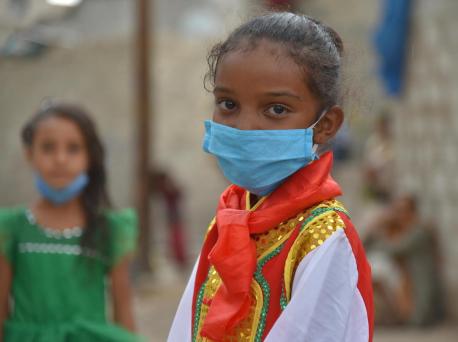
In Yemen, Moms Sew Masks to Protect Their Kids and Their Community
COVID-19 is just the latest threat for families in Yemen. With support from UNICEF, members of a mothers' group are making their own DIY masks.
Yemen's health care system was already crumbling even before the appearance of the novel coronavirus. Economic collapse and food insecurity brought on by more than five years of civil war have left the nation's families struggling to survive.
A program created to fight the spread of cholera now pivots to take on COVID-19
At the Al-Shab IDP center in Aden, Yemen, 350 families driven out of their homes by violence in Taiz and Al Hudaydah are living in cramped quarters. Access to safe water, necessary to prevent disease transmission, is limited. UNICEF and partners have been working in the IDP centers for some time, providing health care and water and sanitation services. After a cholera outbreak in 2017, they mobilized groups of mothers to teach their neighbors how to stay safe. The mother-to-mother (M2M) educators went door-to-door sharing health information and distributing hygiene supplies to help families in the community protect themselves from cholera.

Living conditions are cramped and water is scarce in centers for families displaced by violence in Yemen, making it difficult to practice public health guidance to prevent the spread of COVID-19. © UNICEF Yemen / 2020
Using the money they earned from their peer educator work, mothers bought sewing machines to make clothes and generate some income. Now, with the spread of COVID-19 around the world, the mothers have mobilized again, sewing masks to help their neighbors stop the spread of the virus. They make up to 100 masks a day and distribute them to families while sharing important messaging about social distancing and handwashing.

Umm Ibrahim, a member of the UNICEF-supported mother-to-mother educator group at the Al-Shab IDP center in Aden, Yemen, sews masks to protect families in her community from the spread of COVID-19. © UNICEF Yemen / 2020
"As a member of the mothers' club, I gained great knowledge on how to protect myself, my family and my community from COVID-19," says Umm Ibrahim, a M2M peer educator (above). "I try to spread messages while maintaining social distancing and protective measures. The incentives I gained enabled me to buy a sewing machine for tailoring nice clothes. Now I am also making masks for needy people who cannot afford to buy them."

Handwashing, an important strategy in the fight to contain the spread of the novel coronavirus, is a struggle for families displaced by violence in Yemen. UNICEF is working with partners to provide water for communities like the Al-Shab IDP center in Aden. © UNICEF Yemen / 2020
UNICEF is working to suppress COVID-19 transmission at the community level by reaching 16 million people in Yemen with key prevention messages through TV, radio and social media — and through initiatives like the M2M peer education groups.

Members of a mothers' club at the Al-Shab IDP center in Aden, Yemen, home to 350 families displaced by violence, are sewing masks to protect their community from the spread of the novel coronavirus. © UNICEF Yemen / 2020
While countries around the world are focused on containing the spread of COVID-19, four out of five children in Yemen — more than 12 million — are still in need of urgent humanitarian assistance.
UNICEF is reaching 16 million people in Yemen with key COVID-19 prevention messages
UNICEF is on the ground providing health care, water and sanitation services, education, protection, vaccines and cash transfers to help families pay for food, medicines and other necessities. More than 1.2 million children under the age of 5 access health services at UNICEF-supported facilities in Yemen.
Urgent support is needed to keep UNICEF's essential programs up and running. Your generous contribution will help UNICEF continue to save lives and protect the most vulnerable in Yemen.
Top photo: In Yemen, 7-year-old Jabra wears a mask to prevent transmission of the novel coronavirus. © UNICEF/UNI341696/Dhia Al-Adimi
HOW TO HELP
There are many ways to make a difference
War, famine, poverty, natural disasters — threats to the world's children keep coming. But UNICEF won't stop working to keep children healthy and safe.
UNICEF works in over 190 countries and territories — more places than any other children's organization. UNICEF has the world's largest humanitarian warehouse and, when disaster strikes, can get supplies almost anywhere within 72 hours. Constantly innovating, always advocating for a better world for children, UNICEF works to ensure that every child can grow up healthy, educated, protected and respected.
Would you like to help give all children the opportunity to reach their full potential? There are many ways to get involved.





